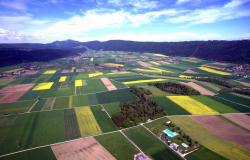The public use of racist, violence-provoking and extremist symbols will be prohibited. After the Council of States, the National supported a motion and two initiatives in this direction on Wednesday. The UDC was mainly opposed to the texts.
The motion tabled by the Legal Affairs Committee of the Council of States provides for punishing the use, wearing and public distribution of propaganda objects and racist symbols, promoting violence or extremists. It also includes gestures, words, salutes or flags. It was adopted by 133 votes to 38 with 17 abstentions.
Like the text tabled by former national councilor Angelo Barille (PS/ZH), it is not limited only to symbols associated with National Socialism. For Philipp Matthias Bregy (C/VS), this is a signal against all forms of extremism, regardless of which side.
“Those who tolerate extremist symbols or gestures also tolerate racism and hatred. We must apply zero tolerance,” continued the Valaisan.
A ban does not restrict freedom of expression, but protects our citizens from acts that incite violence. The promotion of violence has no place in Switzerland, said Philippe Nantermod (PLR/VS). And Sibel Arslan (Vert-es/BS) added that these symbols represent a threat for the people concerned, but also for democracy.
Nazi symbols first
By 132 votes to 40 and 15 abstentions, the National however preferred to act in stages. A ban on Nazi symbols, which are easily identifiable, can be implemented more quickly than other racist and extremist symbols.
“We do not want a swastika or a Hitler salute in our country,” said Raphaël Mahaim (Vert-es/VD) on behalf of the committee. And to remember that complacency towards anti-Semitism is to be complicit in crimes against Jews.
Raphaël Mahaim recalled that it was not a question here of making a classification of the most horrible crimes in History. If there is unanimity for a ban on Nazi symbols, the discussion is more difficult for others, he stressed.
If Nazi symbols are known to everyone, that does not mean that we should not do the work and ban other extremist symbols and gestures, several speakers recalled. “It is feasible,” said Minister of Justice and Police Beat Jans. But the law must be formulated in a sufficiently open manner to adapt to current events.
Increase in cases
The need for action is driven by the growing increase in anti-Semitic incidents in Switzerland. On March 2, a 15-year-old teenager radicalized in Tunisia attacked an Orthodox Jew in Zurich.
>> Read also: Sharp increase in anti-Semitic acts throughout Switzerland
For several weeks, the Young UDC have been facing accusations of collusion with the far right. The head of the Youth Party would have taken part in a meeting with the far-right Austrian Martin Sellner, banned from entering Germany, and members of Junge Tat, a Swiss far-right group monitored by the Security Service. federal intelligence.
>> Read also: Aargau police dissolve far-right rally, expel Austrian ideologue
Several cantonal sections have distanced themselves from extremist groups. For the president of the first Swiss party, Marcel Dettling, the growing radicalization is unacceptable. Tagging swastikas or making Nazi remarks is intolerable, he defended during an interview with RTS. And remember that the UDC has red lines which concern right and left extremism.
>> Read also: Marcel Dettling: “It is up to politics to act so that there is no extremism”
ats/ebz






